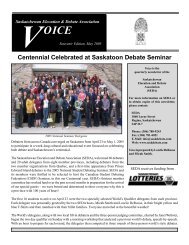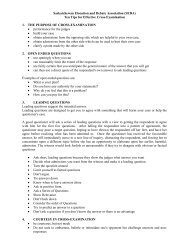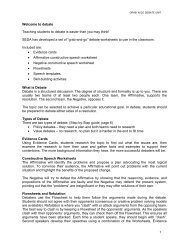Human Cloning - Saskatchewan Elocution and Debate Association
Human Cloning - Saskatchewan Elocution and Debate Association
Human Cloning - Saskatchewan Elocution and Debate Association
Create successful ePaper yourself
Turn your PDF publications into a flip-book with our unique Google optimized e-Paper software.
Ban cloning. Do you copy? Page 1 of 2<br />
Globe & Mail (Toronto, Canada), July 3, 2002<br />
Title: Ban cloning. Do you copy? A proposed law on reproductive technology is right to criminally ban<br />
human cloning, say medical ethicists Francoise Batlis <strong>and</strong> Jocelyn Downie.<br />
Authors: Francoise Baylis <strong>and</strong> Jocelyn Downie<br />
Source: Globe & Mail (Toronto, Canada), p1<br />
Date: July 3, 2002<br />
Early critics of the government's<br />
proposed legislation on assisted<br />
human reproduction have<br />
objected to the criminal ban on<br />
human cloning. They believe<br />
that cloning for research<br />
purposes should not be<br />
prohibited, <strong>and</strong> they particularly<br />
object to using the criminal law<br />
as the mechanism for the<br />
prohibition. Some media have<br />
endorsed these objections — too<br />
bad, because they're misguided<br />
<strong>and</strong> exaggerate the medical <strong>and</strong><br />
economic benefits of human<br />
cloning.<br />
The Assisted <strong>Human</strong><br />
Reproduction Act introduced in<br />
Parliament on May 9 includes a<br />
number of prohibitions. First on<br />
this list is a prohibition against<br />
knowingly creating a human<br />
clone or transplanting a human<br />
clone into a human being.<br />
Anyone so doing could be fined<br />
as much as $500,000, or<br />
imprisoned for as many as 10<br />
years, or both.<br />
Several different technologies<br />
can be used to make a human<br />
clone, including embryo<br />
splitting, parthenogenesis <strong>and</strong><br />
nuclear transfer technology. For<br />
now, attention is focused on<br />
nuclear transplantation: With<br />
this technology, scientists take<br />
any cell from the body other<br />
than the egg <strong>and</strong> sperm <strong>and</strong><br />
remove its nucleus. The nucleus<br />
contains the bulk of the DNA<br />
that makes each of us<br />
genetically unique. This nucleus<br />
is then used to replace the<br />
nucleus of an unfertilized egg,<br />
which is activated to develop<br />
into an embryo that will have<br />
the same DNA as the person<br />
who donated the original body<br />
cell. If this embryo is used for<br />
stem-cell research, it will be<br />
dissected <strong>and</strong> used to create an<br />
embryonic stem-cell line. Stemcell<br />
research has the potential to<br />
transform the treatment of<br />
Alzheimer's <strong>and</strong> Parkinson's<br />
disease, heart disease, muscular<br />
dystrophy, stroke <strong>and</strong> diabetes.<br />
However, what the public needs<br />
to underst<strong>and</strong> is that stem-cell<br />
research <strong>and</strong> cloning research<br />
are separate. It's possible to<br />
support stem-cell research using<br />
"spare" embryos created by in<br />
vitro fertilization without, at the<br />
same time, supporting the<br />
creation of research embryos<br />
using cloning technology.<br />
So why the fuss about human<br />
cloning? Stem-cell scientists<br />
want to use cloned embryos<br />
instead of IVF embryos because<br />
if the transplanted stem cells<br />
have the same DNA as the<br />
patient, they hope it may be<br />
possible to prevent potential<br />
immune rejection.<br />
However, there may not be any<br />
immune rejection problem with<br />
transplanted IVF embryonic<br />
stem cells. Besides, we're still<br />
years away from clinical trials<br />
of stem-cell therapies involving<br />
humans. Canadian scientists<br />
first have to learn how to<br />
develop <strong>and</strong> exp<strong>and</strong> embryonic<br />
stem-cell lines; years of study in<br />
testing potential stem-cell<br />
therapies in animals will follow<br />
before research involving<br />
humans is contemplated. At that<br />
point, the potential immunity<br />
benefits of deriving human stem<br />
cells from cloned embryos may<br />
become relevant. Until then,<br />
these potential benefits are not<br />
relevant, because the cells aren't<br />
being transplanted into humans.<br />
Creating cloned human embryos<br />
for research is a step of<br />
enormous moral consequence.<br />
It's still not clear that it's a<br />
necessary step. So why take it?<br />
For now, cloning human<br />
embryos should be prohibited.<br />
Even those proponents of<br />
unrestricted research who accept<br />
the prohibition object to the<br />
proposed mechanism: criminal<br />
law. They say it's too inflexible<br />
to deal with a scientifically <strong>and</strong><br />
socially dynamic issue. But with<br />
political will, legislation can be<br />
changed in as little as 24 days;<br />
surely this isn't too much time to<br />
reflect on a step as serious as<br />
changing the legal status of<br />
human cloning.<br />
Those who object to the<br />
criminal ban on cloning argue<br />
that we need a regulatory<br />
scheme that encourages public<br />
discussion about the potential<br />
harms <strong>and</strong> benefits of human<br />
cloning. However, law<br />
encourages public deliberation<br />
more than regulation does,<br />
because regulations aren't<br />
debated in the House, <strong>and</strong><br />
therefore don't come to media<br />
attention <strong>and</strong> public scrutiny.<br />
Finally, critics of the proposed<br />
legislation suggest that criminal<br />
law is too "severe" a tool. To<br />
that objection, we say: If<br />
Canadians think prohibiting<br />
human cloning is a serious





